Dressed to kill and with a fresh coat of paint on the interface, the Nokia X7 is keen to show there's still fight left in Symbian. The screen is a definite high point and the stainless steel body is fashioned like a stealth jet fighter. Symbian Anna adds in features that have been lacking in the OS, closing the gap on the competition.

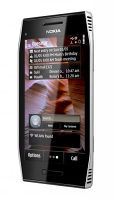
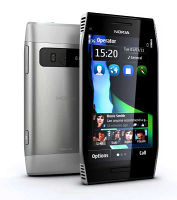
Nokia X7 official photos
The Nokia X7 combines stainless steel and Gorilla glass into one seriously attractive package. It boasts stereo speakers (just two, rather than four as you might think looking at it) to justify its Xseries spot and an 8MP
camera with 720p video recording.
The screen impressed us quite a bit as you'll see in our hardware chapter but that's not all we liked about the hardware. The software changes are not as far-reaching as we would have liked, but there are some key developments that that give Symbian a usability boost.
Here's the short version of what the Nokia X7 is about and what didn’t work out very well.
Key features
- Quad-band GSM/GPRS/EDGE support
- Penta-band 3G with 10.2 Mbps HSDPA and 2 Mbps HSUPA support
- Stainless steel body
- 4" 16M-color AMOLED capacitive touchscreen of 640 x 360 pixel resolution; Impressive brightness and Gorilla glass protection
- 8 megapixel fixed-focus camera with dual-LED flash and 720p video @ 25fps recording; geotagging, face detection, smart zoom in video
- Symbian Anna OS
- 680 MHz ARM 11 CPU and 256 MB RAM
- Wi-Fi 802.11 b/g/n
- GPS receiver with A-GPS support and free lifetime voice-guided navigation
- Digital compass
- microSD card slot (8GB card pre-installed)
- DivX and XviD video support
- Built-in accelerometer and proximity sensor
- Standard 3.5 mm audio jack
- Stereo FM Radio with RDS
- microUSB port
- Flash and Java support for the web browser
- Stereo Bluetooth 3.0
- Excellent audio quality
- Smart dialing and voice commands
- Social networking integration
Main disadvantages
- Symbian Anna is still catching up with Android and iOS
- Uncomfortable volume rocker, SIM tray and microSD card slot
- Camera lacks auto focus, oversharpens images
- Relatively limited 3rd party software availability
- No office document editing (without a paid upgrade)
- Battery life is not on par with the best in business
The Nokia X7 is something you'll want to show off to your friends. The Nokia designers have done a good job of breaking the touchscreen mould that makes so many phones look uniformly similar.

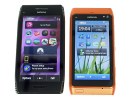
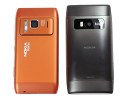
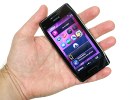
Nokia X7 in our office
The Nokia X7 comes more as a successor to the C7 than a stand-alone version. But the C7 itself will be getting Symbian Anna soon, so the X7 needs to bring more to the battlefield than just the (admittedly great) bigger screen.
First we'll check on the arsenal in the box and then we're off to inspect the phone's angular charms. Join us on the next page to feast your eyes on the cool screen and discover the Nokia X7.
Design and construction
The Nokia X7 is a gorgeous phone - it has a bold, futuristic design that gives it broad appeal but geeks will look at the angular shapes and instantly think F-117 Nighthawk. We've handled both the Dark steel and Silver steel versions and both of them look extra sharp.The shape of the phone is rectangular with the four corners beveled. Each corner shows a grill although only two of them (the bottom ones) house actual loudspeakers. The grills look cool anyway. The mostly metallic back is rounded making the phone more comfortable to hold than an angular back would have been.

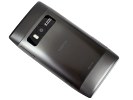
The Nokia X7 looks like a stealth jet fighter
The front of the Nokia X7 is dominated by an amazing 4" nHD AMOLED screen. The lower pixel count is the only thing holding this display back - 360 x 640 is a bit of a stretch for a 4" diagonal. Still, the 4" SuperAMOLED of the Samsung Galaxy S only has about 10% more subpixels than the X7's AMOLED screen. The difference is by no means huge.
The screen on the X7 is also the brightest AMOLED we've tested. It's actually one of the brightest displays we've ever tested, LCDs included. The only brighter display we've seen is LG'c NOVA display, which is some 20% ahead. Still, AMOLEDs are traditionally darker than LCDs so the Nokia X7 screen blew us away. Contrast is infinite technically but that's the usual.

The Nokia X7 and N8 displays compared
Here's the table with our brightness measurements
| Display test | 50% brightness | 100% brightness | ||||
| Black, cd/m2 | White, cd/m2 | Black, cd/m2 | White, cd/m2 | |||
| LG Optimus Black P970 | 0.27 | 332 | 1228 | 0.65 | 749 | 1161 |
| Nokia X7 | 0 | 365 | ∞ | 0 | 630 | ∞ |
| Motorola Atrix 4G | 0.48 | 314 | 652 | 0.60 | 598 | 991 |
| Apple iPhone 4 | 0.14 | 189 | 1341 | 0.39 | 483 | 1242 |
| HTC Sensation | 0.21 | 173 | 809 | 0.61 | 438 | 720 |
| Samsung I9000 Galaxy S | 0 | 263 | ∞ | 0 | 395 | ∞ |
| Sony Ericsson XPERIA Arc | 0.03 | 34 | 1078 | 0.33 | 394 | 1207 |
| Samsung I9100 Galaxy S II | 0 | 231 | ∞ | 0 | 362 | ∞ |
| LG Optimus 2X | 0.23 | 228 | 982 | 0.35 | 347 | 1001 |
| HTC Incredible S | 0.18 | 162 | 908 | 0.31 | 275 | 880 |
Viewing angles of the screen are great and colors are lovely and vivid. Sunlight legibility is not perfect but it holds up slightly better than, say, the Samsung Galaxy S II.
The X7 screen sensitivity is as good as we’ve come to expect from capacitive units and touch feedback is very impressive.
Symmetrically placed on either side of the screen are the earpiece and the lone menu key. There are proximity and ambient light sensors hiding near the earpiece. There's no video-call camera here or call buttons. The menu key is relatively big, though it's a bit stiff.


The earpiece and sensors on top • The menu key is the only button on the front
On top of the Nokia X7 is the uniquely shaped Power/Lock key, which also handles screen lock and the ringing profiles (upon a long press). The two wired connectivity ports are here too – the microUSB that can be used for charging and the 3.5mm audio jack.
At the bottom, there's just the mic pinhole and some labels.
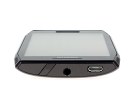
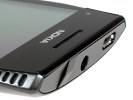
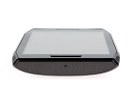
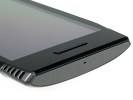
The two wired connectivity ports and the power key
The sides of the Nokia X7 are quite interesting. The left houses the two trays: one for the microSD card (top) and one for the SIM card (bottom). The right side is home to the volume rocker and the shutter key.
Let's start with the keys. They have a very low profile and both are frustratingly hard to use. Because they sit on the sloping edge of the back, every time you press one of them, your finger slides down pushing the phone up. We kept getting the feeling that sooner or later the phone was going to slip.


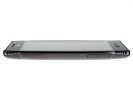
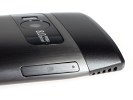
microSD and SIM card slots on the left • the uncomfortable volume rocker and shutter key on the right
The trays for the SIM and microSD cards are not our favorite design decisions either. Both work the same way - you press on the dot, which cause the other end to tilt up. Then you try to pry and pull it out. That's rather annoying but the microSD slot still counts as "hot-swappable" we guess.
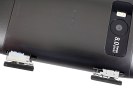
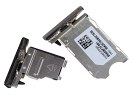
The trays for the SIM and microSD cards
When you're done, you have to push the tray back in and we question the life expectancy of a slot that will see quite a bit of metal rubbing against metal. That's the price of beauty (or rather the metal body in this case).
The four corners of the Nokia X7 are fashioned into loudspeaker grills but that’s just for show - only the bottom ones actually hide loudspeakers. Having four speakers would have been impressive (and we imagine quite loud) but two work well enough.
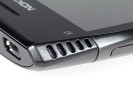
The bottom two are loudspeakers the other two are impostors
On the back we find the camera lens, dual-LED flash banded together on a black strip. The camera doesn’t protrude but when you put the phone down it rests on it, making it prone to scratches (there’s no lens cover).

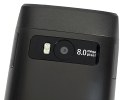
The 8MP camera and its dual-LED flash
Most of the back is a solid piece of brushed-finish stainless steel, with plastic elements capping the top and bottom ends of the phone (just like on the Nokia N8). The metal gives the X7 a very sturdy feel, which users like us prefer over plastic.
One downside to this is that the battery isn't user accessible - you can't carry a backup piece to extend the battery life of the X7.
Speaking of battery life, the Nokia X7's battery is quoted at up to 450 hours of stand-by (in both 2G and 3G modes) or up to six and a half hours of talk time (and only four and a half hours in 3G). Nokia also claim 6 hours of video playback (with 720p videos) and 50 hours of music playback (in offline mode).
The battery performance of the X7 isn't overly impressive. As a reference, the Nokia C7 claims to squeeze 550 hours of standby and 9 h 30 min of talk time (that's in 2G) out of the same 1200mAh BL-5K battery.
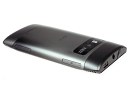
The curved metal back of the Nokia X7
The build quality of the Nokia X7 is impressive though we don't agree with some of the design decisions (the buttons on the rounded edge of the phone and the card trays). The finish of the X7 proved delicate and quickly acquired a few scratches so you have to be careful with it (a carrying pouch in the box would have been great).
Still, there's no denying that the X7 is a beauty to look at and it's quite slim and compact. The curved back makes the phone very comfortable to hold despite the angular looks.
| source |





0 comments:
Post a Comment